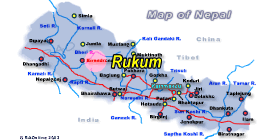| Autonomous
People's Governments Formed |
As
per the Party's known policy of granting autonomous rule along with rights
of self-determination to the oppressed nationalities and regions, a campaign
is now underway to form autonomous people's governments in the liberated
areas. After completing the process of forming elected people's committees
at village and district levels on the basis of revolutionary united front
policies, currently regional level people's governments are being installed
in different parts of the country.
On
January 9, Magarat Autonomous Region People's Government was declared amidst
a huge mass meeting of over 75 thousand people in the historic Thawang
village in Rolpa district. As may be recollected, this is the main base
area of the revolution and is inhabited by the most oppressed Kham Magar
nationality.
Similarly,
on January 19, Bheri-Karnali Autonomous Region People's Government was
formed under the leadership of Com. Khadga Bahadur B.K. and made public
amidst a big mass rally in Jajarkot district. It may be noted that Karnali
region is the most remote and backward area of the country. This is also
one of the major storm centres of the revolution.
Soon
such Autonomous People's Governments would be formed in Seti-Mahakali Region,
Tharuwan, Tamuwan, Tamang Region, Kirat, Madhesh, etc.
Meanwhile,
the URPC has recently issued a "Directory for Administration of People's
Power, 2004," to bring harmony to the administration of local people's
power in the base areas throughout the country. In this Directory, separate
chapters are included for the administration of Autonomous Regions and
Local Bodies, General Administration, Public Security, Revolutionary Land
Reform, Forest Management, Industry, Commerce and Finance, People's Cooperatives,
Physical Infrastructure Development, Public Health, Public Education, People's
Culture and Social Welfare. Similarly a Public Legal Code has been formulated
to administer the New Democratic people's power.
| Source:
C P N (M a o i s t) Bulletin - Maoist official statement - January
2004 |
|
The
"People's Government" |
 |
For
the first time in the nearly five years since they began their insurgency,
the Maoists have announced the formation of a "People's Government". This
is a major challenge to the Congress government. In Rukum district the
people's government was formed on 1 and 2 December. Besides a chief and
a deputy chief, 15 others were elected as representatives. Top Maoist officials
and other cadres attended this ceremony. |
The
Maoists have chosen Rukum as their temporary programme area, following
which a government was formed there. After a two-day meeting in Rukum it
was decided that 43 village development committees would take part in choosing
the district people's government.
Maoist
leaders present at the elections stated that this is a temporary people's
government formed at the time of a peoples' war. This is also Nepal's first
temporary government. The entire district has been left open to the Maoists
after all police posts were moved to the district headquarters. Maoist
sources also said that the government recently formed is a transitional
one, and elections would soon be held for a permanent one.
The people's
government is going to provide security to the villages, provide help to
the families of the martyrs, help in local development, protest when the
police or army enter the villages, and help increase the productivity of
the farmers. What is not clear is where the money will come from to provide
for all this work. The government in Kathmandu was on the verge of providing
development funds to the districts of Rukum, Rolpa, Kalikot and Jajarkot
with the help of the security forces. The formation of the peoples' government
has now brought in a new element to the affair.
The
Maoists formed the district people's government with great enthusiasm but
it is going to be difficult for them to protect this district with the
same enthusiasm. This decision was taken in haste and shows political immaturity
and leftist opportunism and is going to prove a political blunder.
 |
|
1.
|
All
bilateral and multilateral treaties and agreements found unjust or unequal
will be scrapped. All treaties that were secretly entered into will be
made public and those that are not fair will be scrapped. Special facilities
currently being provided to powerful countries will be ended. |
|
2.
|
Will
not be part of any military alliance and will protest any action that tries
to subjugate a third country by force. |
|
3.
|
Will
follow an independent foreign policy and is not going to be a member of
useless organisations such as SAARC. |
|
4.
|
Will
keep all neighbours at the same distance, will follow and practise a policy
of equality, friendship and understanding with all countries. |
|
5.
|
Will
not establish relations with countries that discriminate on the basis of
religion, colour, caste or are carrying out military action against a third
country. Existing treaties with such countries will be scrapped. |
|
6.
|
Unjust
military action will be protested against and help in all forms will be
provided to the country against which military action is being taken. |
|
7.
|
Aid
in whatever form will be provided to people who are being oppressed in
their particular countries and even if a civil war is taking place, the
oppressed will be provided aid. |
|
8.
|
Voices
will be raised in the international forums to fight for the rights of land-locked
countries. |
|
9.
|
Only
treaties that are equal and beneficial to both the parties will be signed,
and exchange programmes will be held at regular intervals. |
|
10.
|
Treaties
that foster friendship and understanding will be promoted. |
|
 |
 |
 |
 |
 |
 |
 |
|




